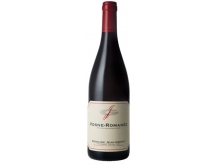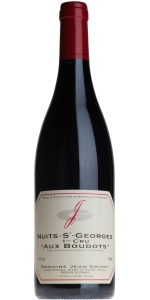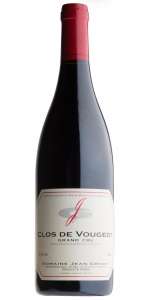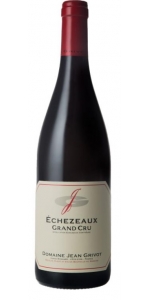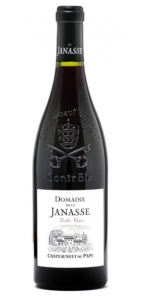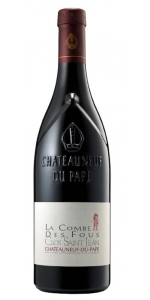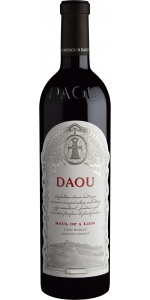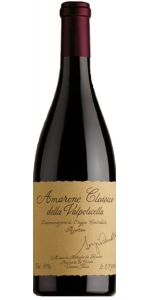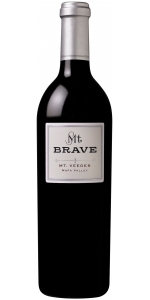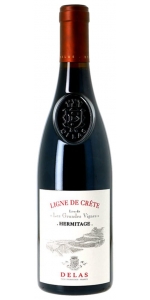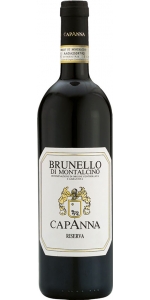Domaine Jean Grivot Vosne-Romanee 2020
| Country: | France |
| Region: | Burgundy |
| Winery: | Jean Grivot |
| Grape Type: | Pinot Noir |
| Organic: | Yes |
| Vintage: | 2020 |
| Bottle Size: | 750 ml |
Domaine Jean Grivot Nuits-Saint-Georges Premier Cru Aux Boudots is made from 100 percent Pinot Noir.
Domaine Jean Grivot is among the great names in Burgundian wine. Étienne Grivot and his wife Marielle took over from Étienne’s father Jean Grivot in 1987. The vineyards are densely planted and farmed organically “sans certification” while the aim in the cellar is for balance and clear expression of terroir.
Jean Grivot’s 38.3 acres spread across 22 appellations with vineyards in the communes of Vosne-Romanée, Vougeot, Chambolle-Musigny, and Nuits-Saint-Georges. Besides the three grand crus, there are 8 premier crus including the much lauded Les Beaux Monts and Suchots in Vosne-Romanée. The grapes are completely de-stemmed and fermentation is spontaneous.
Nuits-Saint-Georges Aux Boudots 1er cru lies in the “Zone Vosnoise” or northern end of Nuits-Saint-Georges just below Les Damodes. It borders Vosne-Romanée Aux Malconsorts 1er just to its north. Its position slightly lower on the slope with deep soil full of pebbles results in a richer and fuller wine.
The grapes are destemmed and maceration à froid usually lasts just a day or two. The alcoholic fermentation is spontaneous and malolactic fermentation occurs in barrel. Depending on the vintage, the proportion of new oak is around 30-60% for the premier crus.
The wine shows aromas and flavors of red berries, herbs, and purple flowers. The palate is rich with ripe fruit and medium weight with bright acidity and fine tannins. Aging in 30-60% new Burgundian pièce brings notes of vanilla, toast, and baking spices.
Red Burgundy might be the world’s most flexible food wine. The wine’s high acidity, medium body, medium alcohol, and low tannins make it very food-friendly. Red Burgundy, with its earthy and sometimes gamey character, is a classic partner to roasted game birds, grilled duck breast, and dishes that feature mushrooms, black truffles, or are rich in umami.
Reviews:
‘The 2020 Nuits Saint-Georges Aux Boudots Ter Cru has the best aromatics among Grivat Nuits Saint-Georges with very well defined red berry fruit, briary and lignt sous-bois aromas. The palate is medium-badied with fine-grain tannins, slightly savory on the entry, fresh and saline on the finish. This has real verve and class, though it will benefit from time in bottle
-Vinous 93-95 Points
A wine with the substance and structure to support the generous lashings of new oak used for maturation, and the overall effect is elegant and classic in style. Aux Boudots, where Grivot has 0.85ha, is at the northern edge of Nuits, just over the border from Vosne-Romanée Malconsorts. They began to pick on the 3rd of September – Etienne specified that they are very particular that the tannins are ripe and do what they can to prolong the vegetative cycle. Still, the grapes were picked with an entirely correct pH of around 3.4.
-Decanter 94 Points
Domaine Jean Grivot Clos de Vougeot Grand Cru is made from 100 percent Pinot Noir.
Domaine Jean Grivot is among the great names in Burgundian wine. Étienne Grivot and his wife Marielle took over from Étienne’s father Jean Grivot in 1987. The vineyards are densely planted and farmed organically “sans certification” while the aim in the cellar is for balance and clear expression of terroir.
Jean Grivot’s 38.3 acres spread across 22 appellations with vineyards in the communes of Vosne-Romanée, Vougeot, Chambolle-Musigny, and Nuits-Saint-Georges. Besides the three grand crus, there are 8 premier crus including the much lauded Les Beaux Monts and Suchots in Vosne-Romanée. The grapes are completely de-stemmed and fermentation is spontaneous.
About the Vineyard:
Clos de Vougeot grand cru was acquired by Étienne’s grandfather, Gaston Grivot, in 1919. The total holding is 4.6 acres from the middle of the vineyard to the lower wall and the average vine age is 40 years old. A good Clos de Vougeot should be a complete wine without any one feature standing out. It is a perfect balance of power, aroma, and flavor.
Wine Production:
The grapes are destemmed and maceration à froid usually lasts just a day or two. The alcoholic fermentation is spontaneous and malolactic fermentation occurs in barrel. Depending on the vintage, the proportion of new oak is around 40-70% percent for the grands crus.
Tasting Notes:
The wine shows aromas and flavors of red berries, herbs, and purple flowers. The palate is rich with ripe fruit and medium weight with bright acidity and fine tannins. Aging in 40-70% new Burgundian pièce brings notes of vanilla, toast, and baking spices.
Food Pairing:
Red Burgundy might be the world’s most flexible food wine. The wine’s high acidity, medium body, medium alcohol, and low tannins make it very food-friendly. Red Burgundy, with its earthy and sometimes gamey character, is a classic partner to roasted game birds, grilled duck breast, and dishes that feature mushrooms, black truffles, or are rich in umami.
Review:
This round version is packed with ripe black cherry, violet, graphite and tobacco flavors. The silky texture and vibrant acidity work in tandem, while refined tannins provide support without getting in the way. There are a few edges to be worked out, yet this is long and concentrated.
-Wine Spectator 95 Points
Domaine Jean Grivot Echezeaux Grand Cru is made from 100 percent Pinot Noir.
Domaine Jean Grivot is among the great names in Burgundian wine. Étienne Grivot and his wife Marielle took over from Étienne’s father Jean Grivot in 1987. The vineyards are densely planted and farmed organically “sans certification” while the aim in the cellar is for balance and clear expression of terroir.
Jean Grivot’s 15.5 hectares spread across 22 appellations with vineyards in the communes of Vosne-Romanée, Vougeot, Chambolle-Musigny, and Nuits-Saint-Georges. Besides the three grand crus, there are 8 premier crus including the much lauded Les Beaux Monts and Suchots in Vosne-Romanée. The grapes are completely de-stemmed and fermentation is spontaneous.
About the Vineyard:
Echézeaux grand cru is a large vineyard of 38 hectares divided into 11 individual climats. Grivot’s parcel is in the climat of Les Cruots and lies at the southern end of Echézeaux near the premier cru of Les Suchots. A good Echézeaux should have rich fruit, considerable earthiness, and be very complete on the palate.
Tasting Notes:
The wine shows aromas and flavors of red berries, herbs, and purple flowers. The palate is rich with ripe fruit and medium weight with bright acidity and fine tannins. Aging in 40-70% new Burgundian pièce brings notes of vanilla, toast, and baking spices.
Food Pairing:
Red Burgundy might be the world’s most flexible food wine. The wine’s high acidity, medium body, medium alcohol, and low tannins make it very food-friendly. Red Burgundy, with its earthy and sometimes gamey character, is a classic partner to roasted game birds, grilled duck breast, and dishes that feature mushrooms, black truffles, or are rich in umami.
Review:
A very elegant expression of Echezeaux, with a velvety black plum and rose petal fruit. There is a lovely freshness and so much finesse that the tannin and structure might surprise you at the end. This has the substance to age for decades. Produced from a 0.84ha parcel in Cruots next to Comte Liger-Belair. The vines were planted in 1954 and the destemmed fruit was gently fermented.
This is pure, racy and enticing, hosting aromas and flavors of black currant, blackberry, violet and iron. This is about finesse, grace and precision balance, with saturated fruit flavors persisting on the superlong aftertaste. Needs a decade in the cellar.
-Wine Spectator 97 Points
All older vintage wines have been purchased from a single collectors cellar. Pictures can be requested before shipment.
Domaine de la Janasse Chateauneuf-du-Pape Cuvee Vieilles Vignes is made from 65% Grenache, 20% Mourvèdre, 10% Syrah, 5% divers.
In contrast to Chaupin, which is made from old-vine Grenache on sandy soils, the cuvée Vieilles Vignes is from old vines of Grenache, Mourvedre, Syrah along with smaller percentages of other permitted varieties that are grown in these old vineyards. The wine is sourced from 4 terroirs: pebbly clay, sand, gravelly red clay and sandy limestone. Vieilles Vignes is always the most powerful and concentrated Châteauneuf-du-Pape cuvée made at Domaine de la Janasse.
Review:
The 2020 Châteauneuf Du Pape Vieilles Vignes also saw some stems (the estate started keeping some stems with the 2016 vintage) and was 75% destemmed, with the blend being 70% Grenache, 20% Mourvèdre, and the rest Syrah, Cinsault, and Terret Noir. As usual, it’s a more powerful, black-fruited wine comparted to the Cuvée Chaupin and has lots of crème de cassis, liquid violet, crushed stone, woodsmoke, and peppery herbs. It displays the vintage’s purity and freshness yet brings the concentration as well as the structure. I’ll be shocked if it’s not in the handful of top wines in the vintage.
-Jeb Dunnuck 96-98 Points
Clos Saint-Jean is a 41-hectare estate in Châteauneuf-du-Pape run by brothers Vincent and Pascal Maurel. Considered by many critics and wine-writers as the preeminent estate espousing the modern style of winemaking in Châteauneuf, this cellar is one of the oldest in the region, having been founded in 1900 by the greatgreat-grandfather of Vincent and Pascal, Edmund Tacussel. A short time after its founding and well before the AOP of Chateauneuf-du-Pape was created in 1923, Edmund began bottling estate wines in 1910.
The farming at Clos Saint-Jean is fully sustainable due to the warm and dry climate, which prevents the need for chemical inputs. Instead, Vincent and Pascal employ organic methods for pest control, mainly pheromones, to prevent pests from taking up residence in their vines, a process called amusingly enough in French, confusion sexuelle. The vines tended manually, and harvest is conducted in several passes entirely by hand.
Combe des Fous literally means, the hill of the fool. The hill, in this case, is located in the far southern reach of Le Crau which was left barren for many centuries because the layer of galets was so exceedingly deep that everyone assumed vines could never survive there. The fool in this situation is Edmund Tacussel, the great-great-grandfather of Vincent and Pascal Maruel who planted a Grenache vineyard on this site in 1905. That old-vine Grenache form the heart of this cuvée with a small amount of Syrah, Cinsault and Vaccarèse. La Combe des Fous is only made in the best vintages.
Review:
Pumps out heady raspberry, mulberry and blackberry compote notes that keep form and direction, thanks to a roasted apple wood spine and flanking ganache, garrigue and warm earth notes. Seriously grippy finish. Grenache, Syrah, Cinsault and Vaccarèse.
-Wine Spectator 96 Points
The 2020 Châteauneuf Du Pape La Combe Des Fous is a normal blend of 70% Grenache, 20% Syrah, and the rest Vaccarèse and Cinsault. Beautiful, full-bodied aromas and flavors of ripe black raspberries, violets, ground pepper, lavender, and herbes de Provence all emerge from this gorgeous barrel sample, and it shows the pure, fresh, yet still concentrated style of the vintage brilliantly.
-Jeb Dunnuck 94-97 Points
Domaine Jean Grivot Vosne-Romanee is made from 100 percent Pinot Noir.
Domaine Jean Grivot is among the great names in Burgundian wine. Étienne Grivot and his wife Marielle took over from Étienne’s father Jean Grivot in 1987. The vineyards are densely planted and farmed organically “sans certification” while the aim in the cellar is for balance and clear expression of terroir.
Jean Grivot’s 38.3 acres spread across 22 appellations with vineyards in the communes of Vosne-Romanée, Vougeot, Chambolle-Musigny, and Nuits-Saint-Georges. Besides the three grand crus, there are 8 premier crus including the much lauded Les Beaux Monts and Suchots in Vosne-Romanée. The grapes are completely de-stemmed and fermentation is spontaneous.
About the Vineyard:
Vosne-Romanée is from village-level parcels lying between the Vosne and the D974. Domaine Jean Grivot is one of the finest producers here and this wine is intended to be a classic expression of the village with red and black fruit perfumed with spice and violet nuances.
Wine Production:
The grapes are destemmed and maceration à froid usually lasts just a day or two. The alcoholic fermentation is spontaneous and malolactic fermentation occurs in barrel. Depending on the vintage, the proportion of new oak is around 25% for the village appellations.
Tasting Notes:
The wine shows aromas and flavors of red berries, herbs, and purple flowers. The palate is rich with ripe fruit and medium weight with bright acidity and fine tannins. Aging in up to 25% new Burgundian pièce brings notes of vanilla, toast, and baking spices.
Food Pairing:
Red Burgundy might be the world’s most flexible food wine. The wine’s high acidity, medium body, medium alcohol, and low tannins make it very food-friendly. Red Burgundy, with its earthy and sometimes gamey character, is a classic partner to roasted game birds, grilled duck breast, and dishes that feature mushrooms, black truffles, or are rich in umami.
Review:
Ripe plum and blackberry fruit, with well-integrated spice and a silky, plump texture which is nicely balanced by plenty of freshness; a typical village-level Vosne, but one that goes beyond in elegance and finesse. This is a blend of grapes grown both above and below grand crus (Aux Champs Perdrix in the case of the former, Aux Réas and others the latter). The total surface area is 2.5ha. The fruit is destemmed and carefully fermented before ageing in 30% new casks.
-Decanter 94 Points
Domaine Jean Grivot is among the great names in Burgundian wine. Étienne Grivot and his wife Marielle (Patrick Bize's sister) took over from Étienne’s father Jean Grivot in 1987. The Grivot family believes in generational change and in 2017, Étienne and Marielle’s daughter, Mathilde, took over for her parents. Mathilde brings a fresh approach while maintaining the longtime traditions of the Grivot family.
The recently renovated winery and cellar is in Vosne-Romanée where most of the Grivot vineyards are located. The domaine has been assembled over several generations to its current size of 15.5 hectares and includes holdings in three grand crus: Clos de Vougeot, Echézeaux, and Richebourg. Mathilde believes in getting quality first thanks to meticulous vineyard work throughout the year. The result of this hard work is healthy, ripe (both phenolic and sugar levels) and depth of concentration and flavor of the fruit. Today, the vineyards are densely planted and farmed organically “sans certification,” while the aim in the cellar is for balance and clear expression of terroir.
Vosne-Romanée is the home of many great domaines and lays claim to six of the Côte de Nuits’ 24 grand crus. The commune and its vineyards sit between Vougeot to its north and Nuits-Saint-Georges to its south, with the grand crus at mid-slope directly behind the village. Domaine Jean Grivot’s 15.5 hectares spread across 22 appellations with vineyards in the communes of Vosne-Romanée, Vougeot, Chambolle-Musigny, and Nuits-Saint-Georges. Besides the three grand crus, there are 8 premier crus including the much lauded Les Beaux Monts and Suchots in Vosne-Romanée. Étienne believes in farming with minimal impact to the environment and eschews the use of chemicals in the vineyard. He’s also hired a horse, Pirate, to plough his holdings in Richebourg, Echézeaux, Beau Monts, and Suchots to minimize the impact on the soil.
The grapes are entirely destemmed and maceration à froid usually lasts just a day or two. The fermentation starts naturally, with a little punching down before this fermentation begins. There is no more pigeage after fermentation begins, “I don’t like to mix the physical (punching down) with the spiritual (fermentation),” said Étienne. After fermentation, the wines are pumped over once a day before aging in barrel for 15 months. Depending on the vintage, the proportion of new oak is around 25% for the villages appellations, 30-40% for the premier crus and 40-45% percent for the grands crus.
Clos Saint-Jean is a 41-hectare estate in Châteauneuf-du-Pape run by brothers Vincent and Pascal Maurel. Considered by many critics and wine-writers as the preeminent estate espousing the modern style of winemaking in Châteauneuf, this cellar is one of the oldest in the region, having been founded in 1900 by the greatgreat-grandfather of Vincent and Pascal, Edmund Tacussel. A short time after its founding and well before the AOP of Chateauneuf-du-Pape was created in 1923, Edmund began bottling estate wines in 1910.
The farming at Clos Saint-Jean is fully sustainable due to the warm and dry climate, which prevents the need for chemical inputs. Instead, Vincent and Pascal employ organic methods for pest control, mainly pheromones, to prevent pests from taking up residence in their vines, a process called amusingly enough in French, confusion sexuelle. The vines tended manually, and harvest is conducted in several passes entirely by hand.
Combe des Fous literally means, the hill of the fool. The hill, in this case, is located in the far southern reach of Le Crau which was left barren for many centuries because the layer of galets was so exceedingly deep that everyone assumed vines could never survive there. The fool in this situation is Edmund Tacussel, the great-great-grandfather of Vincent and Pascal Maruel who planted a Grenache vineyard on this site in 1905. That old-vine Grenache form the heart of this cuvée with a small amount of Syrah, Cinsault and Vaccarèse. La Combe des Fous is only made in the best vintages.
Review:
Pumps out heady raspberry, mulberry and blackberry compote notes that keep form and direction, thanks to a roasted apple wood spine and flanking ganache, garrigue and warm earth notes. Seriously grippy finish. Grenache, Syrah, Cinsault and Vaccarèse.
-Wine Spectator 96 Points
The 2020 Châteauneuf Du Pape La Combe Des Fous is a normal blend of 70% Grenache, 20% Syrah, and the rest Vaccarèse and Cinsault. Beautiful, full-bodied aromas and flavors of ripe black raspberries, violets, ground pepper, lavender, and herbes de Provence all emerge from this gorgeous barrel sample, and it shows the pure, fresh, yet still concentrated style of the vintage brilliantly.
-Jeb Dunnuck 94-97 Points
DAOU Vineyards Soul of a Lion is made from 78% Cabernet Sauvignon, 12% Cabernet Franc, 10% Petit Verdot.
The 2019 Soul of a Lion is a blockbuster vintage that showcases how Bordeaux varieties are remarkably suited to the terroir of DAOU Mountain. This wine explodes from the glass with a kaleidoscope of aromas and flavors, including blackberry, blueberry, black currant, dark cherry, sweet tobacco, and licorice. An added floral dimension imparts an integrated sense of elegance and freshness. While full-bodied with ultra-high phenolic levels, this wine maintains its evenness and poise through an extraordinarily long finish. Structured, balanced, and powerful, the 2019 Soul of a Lion will reveal its full magnitude after several years of careful cellaring.
Review:
The 2019 Soul Of A Lion is a blend of free-run Cabernet Sauvignon, Cabernet Franc, and Petit Verdot, aged 22 months in 100% new French oak. Opaque ruby in color, it offers aromatic contrast between dark, savory cherry fruit, chargrill and graphite, and top notes of green pepper and rose petals. The palate explodes with detailed flavors and its tannins are already resolved and chocolaty, with seamless acidity and exotic spicy layers emerging on the extended finish. Wow!
-Wine Advocate 97+
Ruby red in color, this Amarone Riserva offers dense and smokey aromas of dark cherries, raisins, chocolate, and anise, framed by fruity tannins and a spicy finish. With the level of complexity and balance that this wine shows, it will evolve beautifully for 10+ years.
Review:
This is one of those wines where your nose is in the glass for ages, enjoying the complex array of aromas that range from raspberries to dates, perfumed bark to polished wood, pressed flowers to fresh mushrooms. Full-bodied, dense and focused with fine, well-integrated tannins, plenty of fruit flavor and an endless finish. A joy to drink even now, but this will age gracefully for many a year.
-James Suckling 98 Points
Mt Brave Malbec is made from 100 percent Malbec.
On the Palate of the 2016 Mt. Brave Malbec killer spice overlays rich boysenberry and black currants. A pop of fruit carries across to the finish which is clearly mountain structure based.
Review:
The 2016 Malbec Mt. Veeder is another fabulous wine from winemaker Chris Carpenter. It offers a vibrant, focused, savory style in its blue fruits, graphite, and lead pencil aromatics, and has a concentrated, layered style on the palate. It’s a complex, age-worthy Malbec that will evolve for over a decade.
-Jeb Dunnuck 96 Points
The 2016 Malbec Mt. Veeder (100% Malbec) is very deep purple-black in color and reveals stunning black and red cherries, black plums and violets with wafts of unsmoked cigars and mossy bark. Full, concentrated and seductive in the mouth, it has a solid line of fine-grained tannins and loads of bold, perfumed fruit, finishing long. 484 cases produced.
-Wine Advocate 95 Points
This shows a vivid boysenberry and blackberry fruit profile, laced with licorice, roasted apple wood and violet notes, all backed by a solidly grippy structure and a late zing of minerality. Best from 2021 through 2038. 6,441 cases made.
-Wine Spectator 94 Points
Delas Hermitage Les Grandes Vignes Ligne de Crete is made from Syrah.
The nose discloses aromas of spice and leather intertwined with deep berry aromas (blackberry, redcurrant) and heady floral notes, liquorice and incense. Its richness, complexity and elegance are by no means a contradiction. The finest granite soils of the Hermitage hillside are to thank for this wine's incredible minerality and finesse. The wine is rich and dense on entry to the palate, where it shows an elegant, broad and flavorsome character. The ripe, smooth and well-integrated tannins contribute to the wine's powerful yet harmonious structure. The palate reveals the same aromas as those found on the nose with nuances of blueberry, raspberry, violet and bitter chocolate. Ligne de Crête is characterized by its exceptional structure, harmony and balance.
This remarkably smooth and elegant wine makes the perfect partner for a pigeon pie, beef tartare ravioli or a roast fillet of deviled duckling with cranberries. It also makes an excellent choice for woodcock, hare "à la Royale" or even a roast rack of lamb in a herb crust.
Review:
Whiffs of espresso, ore and charred meat mingle into thunderous flavors of crème de cassis and roasted plums in this wine. A single-site expression of Les Grandes Vignes from a ripe yet fresh vintage, it's a showstopping Syrah marked with a creamy texture and ripe tannins. Hermitage is not known for youthful pleasures but this rare bottling embraces the hedonism of adolescence along with its potential to gain power and complexity far beyond 2050. Anna Lee C. Iijima
-Wine Enthusiast 97 Points
Inky ruby color. Expansive, smoke- and mineral-accented black and blue fruits, licorice, smoky bacon, mocha, violet and licorice on the highly perfumed nose. Appealingly sweet, mineral-accented cassis, boysenberry, fruitcake, floral pastille and vanilla flavors show superb depth and become spicier with aeration. Shows superb detail and mineral lift on the youthfully tannic, extremely persistent and incisive finish, which features resonating floral and exotic spice notes.
-Vinous 97 Points
Capanna Brunello di Montalcino Riserva 2015
TYPE: DOCG
BLEND: 100% Sangiovese carefully selected in the oldest vineyards and only of the best harvests.
VINIFICATION:
Alcoholic fermentation with maceration of the skins (30-35 days) at a controlled temperature and spontaneous malolactic fermentation, both in truncated cone-shaped Slavonian oak vats.
AGEING:
In Slavonian oak casks of 10 to 25 hl for over 40 months; followed by ageing in bottles for at least 15 months.
NOTES:
Colour: deep ruby red, strong, lively.
Bouquet: very intense and complex, fruity and spicy, with red fruit, jam and liquorice shades; great prospects of future development.
Taste: great structure in the acid-tannin components, well supported by the soft ones; extremely persistent.
Food pairings: roast red meats, game and very aged cheeses.
Review:
Powerful, sparkling garnet red. Rich, very appealing nose with notes of ripe raspberries and fresh plums, some liquorice and fine spice notes in the background. Grippy, fine-meshed tannin on the palate, builds up in many layers, salty, good tension, very long finish in the finish.
- Falstaff 98 Points
- back
It is the purest example of tempranillo grapes from Rioja Alavesa. Coming from a vineyard over a hundred years old with an extremely low production. You can taste a high concentration of ripe fruit, well-bodied, with a final touch of toffee and lime soil plus a perfect acidity which makes this wine fresh and very tempting.
VINEYARD From the Cuba Negra Vineyard in southern Labastida, the El Belisario bottling comes from Tempranillo vines planted in 1910.
ALCOHOL 14.5%
PROCESS Fermented naturally in oak foudre. Malolactic fermentation and aging occur in 100% new French oak barriques over two years.
TASTING Along with its brilliant garnet color, aromas of cherries, dried plums, black pepper, and savory mushroom leap from the glass. The palate is fresh and concentrated with mixed red and black fruit, chocolate, menthol, and coffee. Displays a surprisingly elegant nature. Pair with game, red meat and dark chocolate.
Review:
One of those wines that makes you belief in the special magic of old vines, El Belisario hails from La Greña, parcel planted on limestone rich soils in 1910. Aged in older French barrels, it's a focused, nuanced, wonderfully expressive Tempranillo with raspberry, pomegranate and red cherry fruit, filigree tannins, energetic acidity and sweet, caressing oak spices.
96 Points - Top Rated Single Vineyard in Tim Atkin's 2023 Rioja report
Hansen Lauer Bernkasteler Badstube Riesling is a nice Mosel-Riesling with a lot of minerality and a hint of stewed apple, cantalope and dried orange flavors. The finish is long and clean, which make it very easy to drink.
This is coming from grapes grown on 100% Devonian slate soils. After harvest, the grapes are sorted in order to keep only the best quality. It is then aged on the lees for more than 6 months, giving the wine richness and depth.
The Hansen Lauer Bernkasteler Badstube Riesling goes well with turkey and seafood

